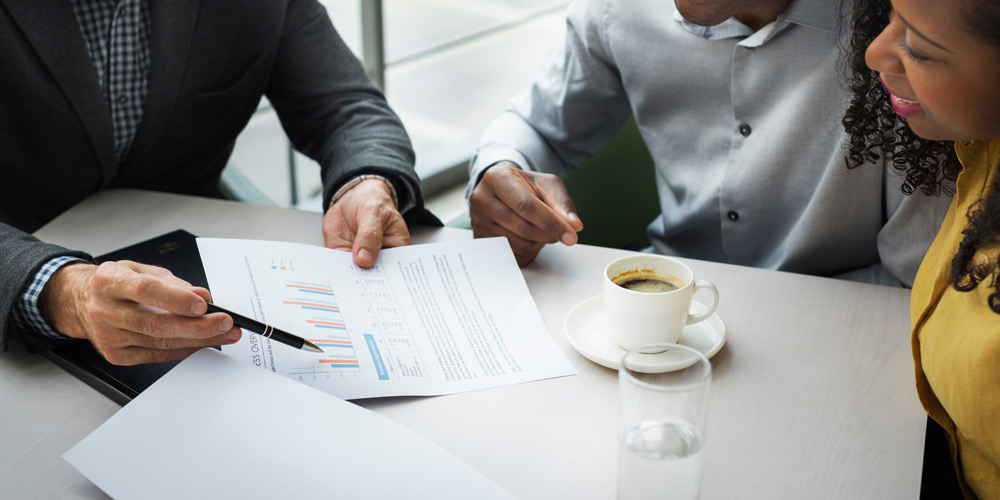Are You Opening a Bank Account with Bad Credit? Here's What You Need to Know.

Please note the below article contains links to external sites outside of OppU and Opportunity Financial, LLC. These sources, while vetted, are not affiliated with OppU. If you click on any of the links you will be sent to an external site with different terms and conditions that may differ from OppU’s policies. We recommend you do your own research before engaging in any products or services listed below. OppU is not a subject matter expert, nor does it assume responsibility if you decide to engage with any of these products or services.
We’re not going to tell you that having a bank account is absolutely necessary. If you’re the type who prefers stuffing your money into mattresses and keeping most of your wealth in the form of precious metals buried in the backyard, more power to you.
But for most people, maintaining a checking account is a financial cornerstone. Without a bank account to hold onto your money, you could end up spending money at check cashing stores just to access your funds and relying on cash payments or costly wire transfers just to pay your bills!
If you have bad credit and need to open a checking account, you probably have a lot of questions. Bad credit can restrict your access to important financial products like personal loans and credit cards, but will it do the same for checking accounts?
You can open a checking account with bad credit.
Let’s start with the good news. Having a poor credit score will not prevent you from opening a bank account.
Your credit score is taken from information on your credit reports; documents that track your history as a borrower, and are compiled by the three major credit bureaus: Experian, TransUnion, and Equifax. The most common type of credit score is the FICO score, which is scored on a scale of 300 to 850. The higher your score, the better your credit.
Your FICO score is used by traditional lending institutions like banks and other personal lenders to determine whether or not to lend to you, but it isn't used when you apply for a checking or savings account.
Learn How To Open a Bank Account
With Zogo, financial education is informative and rewarding. Start your journey to financial mastery today and see where Zogo can take you!
Learn how to open a bank account and manage your money.
Remember what “bad credit” actually means.
It can be all too easy for us to use the term “bad credit” without stopping to remember its significance.
If you have “bad” credit, it means that you have a low FICO score somewhere below 630. FICO scores come in a range between 300 and 850. The lower your score means lower creditworthiness (a FICO score of 680-719 is generally considered to be a “good” score, and anything above that is “great”).
A credit report is a record of your credit usage over the past seven years, although some information on your report can stick around even longer. There are five factors used in calculating your score:
- Payment history: 35%
- Amounts owed: 30%
- Length of credit history: 15%
- Credit mix: 10%
- New credit: 10%
The more poor credit decisions you make such as late payments on bills or excessive increase in credit card balances—the lower your credit score. Lenders may view a low credit score as an indicator of someone who has a history of using credit poorly and therefore a riskier customer probably better suited for a bad credit loan.
Bad credit behavior could hurt your ChexSystems score.
Okay, here’s the bad news. While banks don’t use credit scores with checking account applications, they do use something very similar, oftentimes from ChexSystems, one of several national consumer reporting agencies that track your banking history. Banks use them (or one of their competitors) for checking account applications just like they use FICO scores and credit reports for loans and credit cards.
Not only does Chexsystems produce a Consumer Disclosure Report, they even produce a Chexsystems Consumer Score that’s graded on a scale from 100 to 899. If your score is too low, your application for a checking account will be denied. The bank will look at your banking history and decide that you simply pose too great a risk.
And what kind of behavior is considered “bad” when it comes to banking? Well, it’s stuff like bank overdrafts, bouncing checks, and racking up bank fees and not paying them. Behavior like this points to a customer who is not using their bank account in a responsible manner.
Luckily, a bad Chexsystems Consumer Score is not permanent. Information remains on your Consumer Disclosure Report for five years before dropping off entirely. Five years of good banking behavior (or at least no bad behavior) and you’ll be all set.
But what if you don’t want to wait five years to open a checking account?
How bad credit can lead to no bank account.
The same is true for banks when you’re opening a checking account. If they see you as too big a risk, they aren’t going to let you open an account. As attorney Carmen Dellutri, founder of Dellutri Law Group, puts it, “Banks don't like to take risks, period."
The only difference is that the bank won’t check your credit score or pull a copy of your credit report from one of the three major bureaus. Instead, they will conduct a bank-specific version of a credit check, using a slightly different system to evaluate your creditworthiness. Rather than look at your history of borrowing money, the bank looks at your history of managing bank accounts.
They will most often run the check through a company like ChexSystems. “If you have made mistakes with banks in the past, you might have been put on the ChexSystems list,” says Dellutri. “Those mistakes could include a closed bank account without paying fees, bad credit, or other banking mistakes.” Additionally, an overdrawn bank account that is never paid up will end up being sent to a collections agency—which will show up on both your normal credit report and your ChexSystems report.
If you have bad credit, it’s likely that you’ve overdrawn your checking account or bounced a check or two in the past. The bank running the check will see this in your report from ChexSystems and may deny you an account. So while bad credit won’t directly lead to being denied a checking or savings account, the behavior that leads to bad credit has the potential to do so.
Open a second chance checking account.
Folks with bad credit scores are still able to take out a loan. Sure, it might come with a much higher interest rate and—in the case of a payday loan, cash advance, or title loan—trap them in a dangerous cycle of debt, but it’s still a loan for which they can be approved.
Similarly, people with bad ChexSystems Consumer Scores can still apply for a checking account. Many banks offer “second chance” checking accounts that give people with lousy banking history the chance to make good. You should also check out your local credit union, as many of them offer second chance checking as well.
Second chance checking accounts tend to come with more fees and restrictions than traditional bank accounts, and they offer fewer perks.
In order to get a second chance checking account, you will almost certainly have to pay a monthly maintenance fee. The account might also come with additional requirements like maintaining a minimum balance or having direct deposit. Plus, you still might not get a debit card with the account or be able to use it for online bill pay.
But here’s the best reason by far to use a second chance checking account: many of them come with graduation plans. That means that using the account responsibly for one to two years will allow you to upgrade to a regular checking account ahead of schedule.
Take care of your Chexsystems Consumer Score.
Even if you can graduate to a regular checking account by starting with a second chance account, you should still take care of your ChexSystems Consumer Score. In fact, you should treat it the same way that you treat your regular credit score.
First things first: order a free copy of your Consumer Disclosure Report (by law they have to provide you with one free copy every year upon request). You can request a copy on ChexSystems’ website.
Next, read your report so that you can get a clear idea of where you went wrong. If you have any unpaid fees or charges, pay them! If you can’t pay all of what you owe, try negotiating for a lower amount. And make sure that the financial institution in question updates their records with Chexsystems once the charge is paid off.
Lastly, make sure to check for errors. If you find one, contact Chexsystems to have it corrected. After you’ve gathered the proper documentation, go to the dispute section of Chexsystems’ website for more information. They should send you a resolution within 30 days. You can also dispute the information directly with your (likely former) financial institution and have them update ChexSystems.
The bottom line:
Bad credit means living in a world with strict financial limits. And while it’s a great thing that checking accounts lie within those limits, never forget the following: The kinds of poor money habits that cause bad credit are the same kinds of habits that can cost you a checking account.
If you have bad credit and you're considering borrowing money, check out the OppU Guide to Bad Credit Loans for the questions you should ask yourself first!
Article contributors
-

David Bakke is a finance expert who started his own personal finance blog, YourFinances101, in June of 2009 and published his first book on ways to save more and spend less called ““Don’t Be A Mule…” Since then he has been a regular contributor at Money Crashers.

